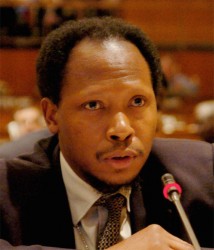Caricom has reiterated its position on the reform of the United Nations Security Council, including its expansion and the addition of a rotating seat to facilitate greater participation by small island developing states.
Addressing the Second Meeting of the Ninth Round of the Inter-Governmental Negotiations on Security Council Reform on behalf of Caricom, Guyana’s Permanent Representative to the UN Ambassador George Talbot noted that the calls for reform go “back several decades”.
“It is the firm belief of Caricom delegations that we must keep in view and work assiduously to fulfil the mandate of our Heads for early reform of the Security Council in order to make it more broadly representative, efficient and transparent and thus to further enhance the effectiveness and the legitimacy and implementation of its decisions,” Talbot said, reading from a statement on behalf of the Caricom Caucus.

He added that “Caricom has remained seized at the highest political level of the need for definitive progress” on the issue.
Developing countries have long expressed their disagreement with what they perceive to be the unfair dynamics of the Security Council. Those in the Caricom block have persisted in calls for the Security Council to be more reflective of the true membership of the international organisation.
Currently, the Security Council comprises 15 members, five of which are permanent, while the remaining 10 are non-permanent members elected for two-year terms by the United Nations General Assembly.
The five permanent members are China, France, the Russian Federation, the United Kingdom and the United States. The current non-permanent members are Argentina, Australia, Azerbaijan, Guatemala, Luxembourg, Morocco, Pakistan, Republic of Korea, Rwanda and Togo.
The composition of the Security Council is one of the major targets of the reform attempt, but there are several others. It addition to categories of membership, reform of the Security Council encompasses the question of the veto held by the five permanent members, regional representation, the size of an enlarged council and its working methods, and the Security Council-General Assembly relationship.
Reiterating Caricom’s position, Talbot said it supports expansion in both the permanent and non-permanent categories, increasing the membership from the current 15 to around 27. Caricom also backs the call, previously endorsed by the L69 (a diverse group of developing countries from Africa, Latin America and the Caribbean, Asia and the Pacific), for a special rotating non-permanent seat to facilitate greater participation in the Security Council by small island developing states. It also maintains calls for developing countries to be given more enhanced roles.
Talbot said Caricom is in support of calls for the elimination of the veto held by the Security Council permanent members. All five permanent members of the Security Council have the power to veto any substantive draft council resolution. He said though, that if a decision is taken to retain this power, all permanent members of the Security Council must have the same rights and privileges of the existing permanent members.
Talbot also reiterated Caricom’s call for increased involvement of the non-permanent members in the work of the Security Council. This, he said, should be done as often as is appropriate as it would enhance the council’s accountability and transparency.
Finally, on the relationship between the Security Council and General Assembly, Talbot restated Caricom’s recommendation that appropriate measures be adopted to enable the General Assembly to function effectively as the chief deliberative, policy making and representative organ of the United Nations.
The UN General Assembly comprises all UN member states and is the principal of all UN organs, its decisions however are non-binding, and are more like recommendations. Despite being one of the smallest, the Security Council is the most powerful of the six UN organs and its resolutions are binding on all UN member states.
Successful reform requires the agreement of at least two-third of UN members, including all the permanent members of the Security Council. Talbot expressed optimism it could indeed be accomplished, and lauded the Permanent Representative of Afghanistan Zahir Tanin who currently chairs the Inter-Government Negotiations, for the nature of his partnership.
“Under Ambassador Tanin’s able stewardship, the reform process has been inclusive, transparent and constructive. Ambassador Tanin has remained true to his commitment to be impartial to the individual positions of member states while being partial to progress. In a negotiation fraught with such complexity, ambassador Tanin’s steady hand has been a source of confidence and has helped to keep the process on an even keel,” Talbot said.




